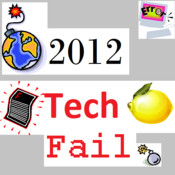Dell Goes Private: What's Next?Dell Goes Private: What's Next?
Dell is going private with the help of $2 billion from Microsoft. Going forward, how much will Microsoft influence operations?


Top 10 Tech Fails Of 2012
Top 10 Tech Fails Of 2012 (click image for larger view and for slideshow)
Dell is officially going private. After weeks of rumors, the company on Tuesday announced it had agreed to a buyout led by CEO Michael Dell, who started the company in 1984 in his UT-Austin dorm room, and private-equity firm Silver Lake Partners. The largest leveraged buyout since the financial crisis began in 2007, the $24.4 billion deal includes Microsoft's expected minority stake of $2 billion.
Under the terms of the agreement, Dell stockholders will be paid $13.65 per share. Dell will entertain competing offers for 45 days, but assuming no unforeseen changes, Michael Dell will remain CEO once the deal becomes official.
In a statement, Dell noted that the price represents a premium of 25% over Dell's closing share price on Jan. 11, the last trading day before buyout murmurs began circulating.
Longtime backers are sure to be disappointed, though. At the height of the dotcom boom, Dell was the world's largest computer maker, with a worth that was more than quadruple the buyout valuation. Even within the last year, the company's shares traded at $18.36, 34.5% more than investors will receive under Tuesday's deal. Then again, shares also dropped as low as $8.69 during the last 52 weeks, so some investors might embrace the deal as the best they're going to get.
[ What effect will Dell's buyout have on you? Read 4 Ways Microsoft-Dell Deal Could Benefit IT. ]
Dell has struggled on Wall Street despite aggressive moves to transform itself into a diversified software and services company. The company spent billions over the last few years acquiring companies such as Quest Software, AppAssure and SonicWall, and its offerings now emphasize cloud computing, converged infrastructure data centers and management software as much as PCs. In December, Michael Dell declared that his company had completed its transformation.
The broadened portfolio didn't help Dell shake its identity as a PC maker, though. Investors were no doubt aware that Dell's revenue streams still rely heavily on computers, and as the PC market tanked, so too did their enthusiasm for Dell's stock. The year 2012 was a step backward for almost all PC vendors but Dell was hit especially hard, losing market share and sales faster than most of its competitors.
At Dell World, Michael Dell told information that his company "is investing for its future" and that short-term losses might be a prerequisite to long-term gains. The buyout can thus been seen as Michael Dell's concession that additional short-term losses could be part of his long-term vision, and that investors focused on quarterly earnings would be an impossible hurdle. In an email, Carter Lusher, chief IT analyst at Ovum, said that Dell's decision to step away from Wall Street scrutiny could forecast "radical changes to its strategy and product roadmap." Lusher said that Dell's chief challenge will be communication with prospects and customers, and suggested that CIOs assess the risk to their infrastructure if Dell's evolving business could change their procurement plans.
Forrester analyst David Johnson wrote in a blog post that he is "bullish" on the deal, and that he sees no immediate cause for concern among customers. Johnson said that acquisitions have made Dell organizationally complex. He expressed optimism that the company would streamline its IP around "a handful of solutions that no other vendor could provide," and lauded the decision to go private, noting that such streamlining would be a "massive undertaking" for a public company. John said he does not expect Dell to drop its PC business.
Microsoft's role as an investor has also been the subject of speculation. Some reports claimed that buyout negotiations emphasized Microsoft's influence within a private Dell, and many wondered if Microsoft was trying to mandate that Windows play a prominent role in future Dell products. Such a requirement has not been disclosed, and Michael Dell has stated that Microsoft won't be a part of day-to-day activities.
Even so, it remains to be seen whether other OEMs will take issue with Microsoft's investment. The software giant's relationship to PC makers is allegedly already strained by Windows 8's mediocre start and Microsoft's decision to enter the hardware space with its Surface line. Others, though, have theorized that Microsoft is more interested in Dell's cloud, big data and virtualization technologies than in the company's PC business.
In his blog post, Forrester's Johnson said Microsoft could see a number of benefits, noting that Dell offers supply-chain expertise, capacity for PC hardware and a chance to better optimize that hardware for Windows. He also noted converged infrastructures for cloud as an area of opportunity.
Constellation Research analyst Ray Wang said in an email that "Microsoft is Dell's biggest backer." In addition to investing in the buyout, Redmond has also supplied Dell with marketing dollars, Wang noted, saying, "We see them very aligned … in the long run."
"Microsoft can't lose another hardware partner and HP is shaky," he wrote, ostensibly in reference to HP's recent Chromebook experiment. "Dell needs to be there."
Attend Interop Las Vegas May 6-10, and attend the most thorough training on Apple deployment at the NEW Mac & iOS IT Conference. Join us in Las Vegas for access to 125+ workshops and conference classes, 350+ exhibiting companies, and the latest technology. Use Priority Code DIPR02 by Feb. 9 to save up to $500 off the price of Conference Passes. Register for Interop today!
About the Author
You May Also Like






